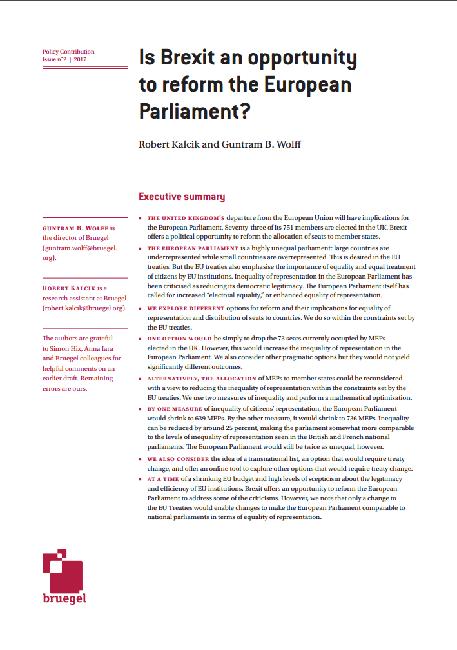| 来源类型 | Policy Contribution
|
| 规范类型 | 简报
|
| Is Brexit an opportunity to reform the European Parliament? |
| Robert Kalcik; Guntram B. Wolff
|
| 发表日期 | 2017-01-27
|
| 出版年 | 2017
|
| 语种 | 英语
|
| 概述 | Brexit offers a political opportunity for the European Parliament to reform the allocation of seats to member states. This Policy Contribution explores different options for reform and their implications for equality of representation and distribution of seats to countries, within the constraints set by the EU treaties. |
| 摘要 | - The United Kingdom’s departure from the European Union will have implications for the European Parliament. Seventy-three of its 751 members are elected in the UK. Brexit offers a political opportunity to reform the allocation of seats to member states.
- The European Parliament is a highly unequal parliament: large countries are underrepresented while small countries are overrepresented. This is desired in the EU treaties. But the EU treaties also emphasise the importance of equality and equal treatment of citizens by EU institutions. Inequality of representation in the European Parliament has been criticised as reducing its democratic legitimacy. The European Parliament itself has called for increased “electoral equality,” or enhanced equality of representation.
- We explore different options for reform and their implications for equality of representation and distribution of seats to countries. We do so within the constraints set by the EU treaties.
- One option would be simply to drop the 73 seats currently occupied by MEPs elected in the UK. However, this would increase the inequality of representation in the European Parliament. We also consider other pragmatic options but they would not yield significantly different outcomes.
- Alternatively, the allocation of MEPs to member states could be reconsidered with a view to reducing the inequality of representation within the constraints set by the EU treaties. We use two measures of inequality and perform a mathematical optimisation.
- By one measure of inequality of citizens’ representation, the European Parliament would shrink to 639 MEPs. By the other measure, it would shrink to 736 MEPs. Inequality can be reduced by around 25 percent, making the parliament somewhat more comparable to the levels of inequality of representation seen in the British and French national parliaments. The European Parliament would still be twice as unequal, however.
- We also consider the idea of a transnational list, an option that would require treaty change, and offer an online tool to explore other options that would require treaty change.
- At a time of a shrinking EU budget and high levels of scepticism about the legitimacy and efficiency of EU institutions, Brexit offers an opportunity to reform the European Parliament to address some of the criticisms. However, we note that only a change to the EU Treaties would enable changes to make the European Parliament comparable to national parliaments in terms of equality of representation.
|
| 主题 | European Macroeconomics & Governance
|
| 关键词 | brexit
European governance
European Parliament
|
| URL | https://bruegel.org/2017/01/is-brexit-an-opportunity-to-reform-the-european-parliament/
|
| 来源智库 | Bruegel (Belgium)
|
| 资源类型 | 智库出版物
|
| 条目标识符 | http://119.78.100.153/handle/2XGU8XDN/429597
|
推荐引用方式
GB/T 7714 |
Robert Kalcik,Guntram B. Wolff. Is Brexit an opportunity to reform the European Parliament?. 2017.
|
|
文件名:
|
PC-2017_02.png
|
|
格式:
|
image/png
|

|
文件名:
|
PC-2017_02-Euro-Parl-310117.pdf
|
|
格式:
|
Adobe PDF
|
除非特别说明,本系统中所有内容都受版权保护,并保留所有权利。
